Sanskaras
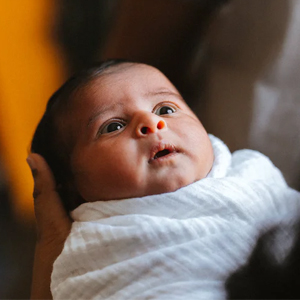
Punyavachanam (Baby Blessing)
A baby blessing pooja is a performed to welcome a newborn baby into the family and bless them with health, prosperity, and happiness. It typically involves the recitation of prayers and mantras, the offering of fruits, flowers, and other auspicious items, and the application of holy ash on the baby’s forehead. The pooja is a significant event for the parents and family, as it is believed to invoke the blessings of the divine for the child’s future. It is a beautiful and heartwarming ceremony that celebrates the miracle of new life and the joy of family.
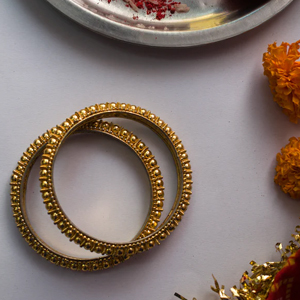
Baby Shower
A baby shower pooja is a traditional ceremony held to celebrate the impending arrival of a new baby. The pooja is performed to offer blessings for a safe and healthy delivery for the mother and baby. During the ceremony, the mother-to-be is adorned with flower garlands and is gifted with various auspicious items such as new clothes, bangles, and sweets. Prayers and mantras are recited, and offerings of fruits, flowers, and other items are made to invoke the blessings of the divine. The pooja is a beautiful and joyous occasion that marks the beginning of a new chapter in the family’s life.
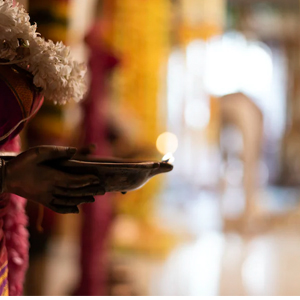
Namakaran Sankar (naming)
A naming ceremony is a traditional event held to give a newborn baby their official name. The ceremony typically takes place 11 or 12 days after the baby’s birth. During the ceremony, prayers and mantras are recited, and the baby is blessed with health, prosperity, and happiness. The parents and family members choose a name for the baby, which is then whispered into the baby’s ear by the father or a family elder. The naming ceremony is a significant event for the family and is considered an auspicious occasion.

Annaprashnam (baby feeding)
Annaprashanam, also known as baby feeding, is a traditional Hindu ceremony held when a baby is ready to begin eating solid foods for the first time. The ceremony is usually performed when the baby is around six months old, although the timing may vary depending on the family’s traditions. During the ceremony, prayers and mantras are recited, and the baby is offered various types of food, including rice, fruits, and sweets. The ceremony is a joyous occasion for the family, and it symbolizes the baby’s growth and development.
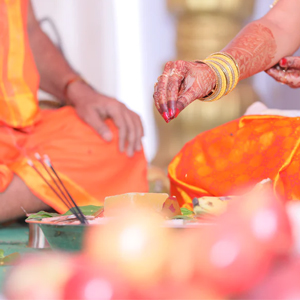
Mundan Sanskar (Hairing Ceremony)
Mundan ceremony, also known as Chudakarana, is a traditional Hindu ritual where a child’s hair is shaved off for the first time. The ceremony is usually performed when the child is around one to three years old, depending on the family’s customs. During the ceremony, prayers and mantras are recited, and the child’s hair is shaved off. The ritual is believed to be a way of purifying the child and symbolizes the shedding of old and negative energy. The ceremony is a joyous occasion for the family, and it is often followed by a feast and other celebrations.
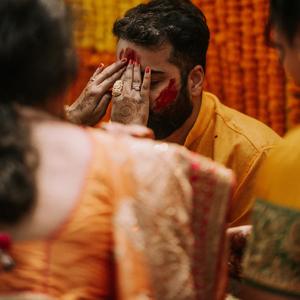
Upavitha (sacred thread) Sanskar
Upavitha, also known as Yajnopavita, is a sacred thread ceremony that involves the wearing of a sacred thread, made of cotton or silk, across the chest and over the left shoulder. The thread is a symbol of the connection between the wearer and the divine, and the ceremony is considered a significant milestone in the boy’s spiritual journey. The ritual is usually performed when the boy is between 8 and 12 years old, and it is typically conducted by a Brahmin priest. After the ceremony, the boy is expected to follow certain rules and regulations as a student of the Vedas.
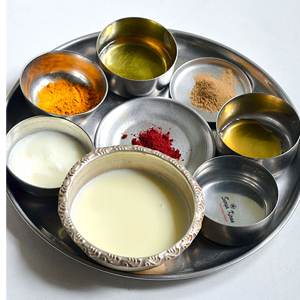
Abishekam
Abhishekam is a ritual of bathing the deity or an idol with various substances such as milk, honey, ghee, water, and other items. The ceremony is performed to show devotion and gratitude to the deity and is believed to bring blessings and spiritual benefits to the worshipper. The ritual is usually performed by a priest or a devotee, and mantras and prayers are recited throughout the ceremony. Abhishekam is an integral part of Hindu worship and is performed on various occasions such as festivals, birthdays of deities, and special events.
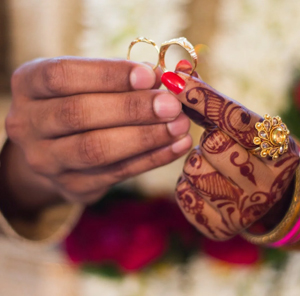
Wedding Ceremony
Rich in symbolism, a wedding ceremony, also known as Vivah, is a sacred union between two individuals that is considered a life-long commitment. The ceremony typically takes place in a mandap, a decorated platform, under which a sacred fire is kindled. The ceremony is a series of rituals and customs that symbolize the unity of two individuals and their families. The bride and groom exchange vows and garlands, and the groom applies sindoor, a vermillion powder, to the bride’s hairline. The ceremony concludes with the couple taking seven vows around the sacred fire and seeking the blessings of the elders. The wedding ceremony is considered a significant event in the couple’s lives.
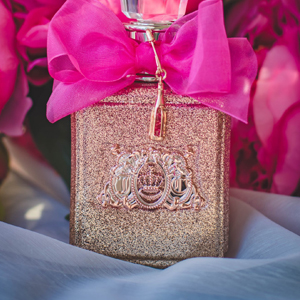
Marriage Anniversary
Marriage anniversary pooja is a ritualistic ceremony performed by couples to celebrate their years of togetherness. The ceremony involves offering prayers and seeking blessings from deities for the couple’s continued happiness and prosperity. The couple usually performs the pooja together and offers items such as flowers, fruits, and sweets to the deities. It is believed that performing this pooja can strengthen the bond between the couple and bring peace, prosperity, and longevity to their married life. The anniversary pooja is an opportunity for the couple to seek blessings for a prosperous future.

Car Blessing
Car blessing pooja is a ritualistic ceremony performed to seek blessings from deities for the safe and smooth operation of a vehicle. The ceremony involves offering prayers, lighting incense sticks, and performing aarti or offering holy flames to the deity. The priest will sprinkle holy water or offer a special puja item like a coconut or turmeric to the car or any other vehicle. The purpose of this pooja is to invoke the blessings of the divine to protect the car and its occupants from accidents, negative energies, and mishaps. This pooja can also help promote good luck and prosperity for the car owner and their family.
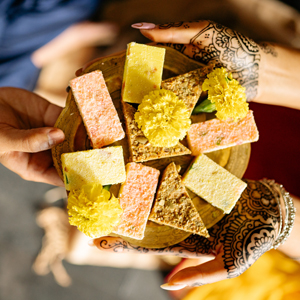
Prasad Offering
Prasad is a term used to refer to food that is offered to the deity during a pooja or ritual ceremony. The food is considered to be blessed by the deity and is then distributed as an act of blessing to the devotees present. Offering prasad is a common practice in temples and during religious ceremonies, and it is believed to be an act of gratitude and devotion towards the deity. The prasad can take various forms, including sweets, fruits, and other vegetarian foods. The act of offering and receiving prasad is considered to be a sacred ritual that symbolizes the bond between the devotee and the deity.
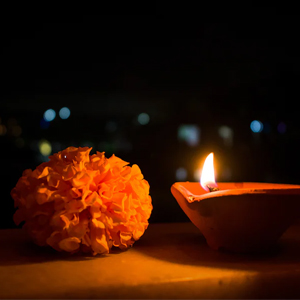
Death Anniversary
Death anniversary of a loved one is known as the “Shraddha” ceremony, is held on the anniversary of the day of the person’s death and is a way for family members to offer prayers and pay their respects to the departed soul. During the Shraddha ceremony, family members perform rituals and offer food and water to the deceased person’s soul, which is believed to help them on their journey in the afterlife. The ceremony is also a way for family members to remember and honor their loved one, and it is considered to be a solemn and sacred occasion. The Shraddha ceremony is an important tradition in Hindu culture and is often observed with great reverence and devotion.

Sanskaras Request
As a temple, our mission is to serve the spiritual needs of our community and provide a welcoming space for devotees to come together and worship.
If you’re interested in performing a pooja or service at the temple, we encourage you to reach out to us. We’re happy to help you arrange everything you need to make your experience meaningful and fulfilling. From booking a time for your pooja to providing all the necessary items, our team is here to support you.
Alternatively, if you would like to invite our priest to perform a pooja or service at your home or another location, we can also accommodate your request. Our priest is experienced in conducting poojas in various settings and is available to travel to locations in Portland, Oregon and nearby cities.
At the temple, we believe that spiritual practice is an important part of our daily lives, and we strive to make it accessible to everyone. Whether you’re new to the practice or have been a devotee for years, we welcome you to join us and experience the power of worship.
Thank you for considering the temple for your spiritual needs. We look forward to hearing from you and serving you in the best possible way.
